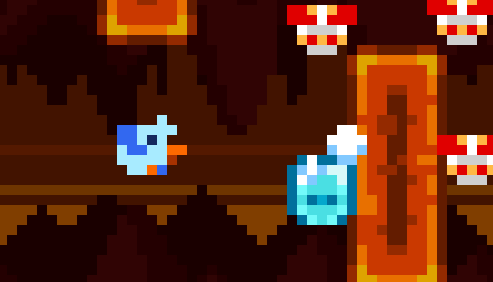Live Free, Play Hard: The Week’s Finest Free Indie Games
Sounds of delight
Voice quest. Brrr-ds! Crew-based shmup. Survival roguelike. IGF runner-up Cart Life.
Looking for more free games? Check out our round up of the best free PC games that you can download and play right now.
SoundSelf Prototype by Robin Arnott, Evan Balster, Topher Sipes
Me and my friend are chanting into my desk microphone. My monitor is a pulsating vortex of lines, sometimes loose and ethereal like ropes of light, sometimes twisting into geometric ribbons.
We’re going high and low pitched, making mouth techno, kinda throat singing, just playing around, seeing what comes out of the aether. Sounds of delight when we make shapes cohere, wondering what the formula is. Too magic.
They finally figured out how to use computers for shared religious experience. SoundSelf disintegrates millennia of our slow retreat from communal singing like nothing ever happened.
Most importantly of all it encourages playing around with the sounds your mouth can make, like shower singing taken out of the shower and turned into an infinitely scaling group activity.
Ice Beak by Nitrome
I like Nitrome's close-up pixels, so immersive and engulfing. This isn't one of those impersonal lava worlds, it's a cozy one where you get right up to the cute little fire skeletons and blast them with ice so they drop on switches and open the way to the next level.
There really is nothing left to say except, I really, truly hope you get the Crystal Snowflakes and save Ice Beak.
Ending by Aaron Steed
Ending is a one-hit kill roguelike based entirely around movement.
The puzzle is, ending your turn next to a facing enemy kills you. Some have one head like a tadpole, others have more.
The minimal menu contains a few modes. One isolates the puzzle element with a series of designed rooms, another generates an infinite maze of organic puzzle caverns. Test chambers versus wilderness.
Escape from Planet Doom by Yori Kvitchko, Dan Gopstein, Tarek El-Gaaly, Ming Jin
Escape from Planet Doom crosses the noble shmup genre with personnel management, swapping around crew to beat incoming enemies.
You have three stations: gunnery, navigation, and shields. Each has two slots for a total of six, but you only have three crew members to divide amongst them.
Adding crew unlocks abilities, like one crew member to navigation makes your ship faster, but two lets you teleport (shades of last year’s excellent Kumiho). With teleport I can stay ahead of the swarming space squid. This is all that matters.
A False Saint, An Honest Rogue by humbit
This chilly survival roguelike begins by telling you to head in a randomly chosen direction. Get far enough and you win.
Don’t freeze (that is, don’t walk over patches of ice). Don’t starve but don’t eat anything poisonous either. If you get lost, use tree shadows to orient.
Your world is a frozen waste eerily seeded with shoes and balaclavas and food and bullets. This feels much creepier than “realistically” placed equipment--like you’re already dying and this is your delirium of endless survival gear management.
Cart Life by Richard Hofmeier
Cart Life is a tycoon game that takes place in real life. Accordingly, it’s ugly and messy and methodical and not a tycoon game.
I pick Melanie, so I start in someone else’s house, her grandparent’s house, and I understand that, it’s intimately familiar to me. I live in a country where the unofficial health care system is the kindness of others, where millions of family and friends take care of each other because no one else will.
Anyway I heard this game has carts!
I wander around town searching for a permit, looking for supplies, figuring out the process needed to obtain the much-rumored cart of the title.
I’m so weary and confused that I miss picking my daughter up at school.
Many games with children have me escorting a child through fantastic environments as I fend off monsters. That rarely happens in real life.
Failing a basic responsibility because of the numbing distraction of poverty, that happens all the time.
The next day I finally get my cart set up, but not before I drop my daughter off and watch her sullenly walk inside the school building. Pangs of guilt.
I have no idea if the game tracks family relationships but failing to pick her up on time yesterday, followed by her moody silence--I feel terrible. I promise to pick her up at 4.
A bus ride later I’m grinding coffee and I’ve sold my first cup. Selling coffee is a series of fast-paced minigames. You’re timed and Cart Life alerts you when you break your best time.
FLASHBACK SEQUENCE: It’s the week of GDC 2013 and I’m talking to Richard over a breaded fish burrito in some dimly lit restaurant. We’re talking about Cart Life, we're commiserating over terrible retail jobs we've worked in the past. He mentions how the mundane actions of our workday routine can form a cadence, an art.
For me it was bagging--folding clothes and tossing hangers and filling bags and swinging them over the counter, all the while keeping an eye on the register. My hands moving faster and faster until I have to calm them down. I got into a kind of fever grinding away in that understaffed, hyper-busy, broke-ass air conditioner retail environment.
When you're only permitted one kind of physicality, you hone it, and sure, it's an art. Cart Life refers to realities like that.
Despite the strongest desires of capitalism, humans aren’t machines. Sometimes your flow gets fucked up and you fail your role as disposable biomechanical assembly line.
You get distracted by memories or someone hot walks by or you’re imagining what you’ll do when your shift ends and then your own hands are alien to you and you’ve forgotten basic math.
Cart Life makes you count change.
Type the phrase “Hot coffee coming right up!” without stuttering. Do it all day long.
The coffee machine screeches as you fuck up repeatedly.
This is, of course, more fun than real life because Cart Life can’t crawl out of the computer and punch your entire body into an exhausted piece of walking talking ground beef with barely enough energy to fall into bed at day’s end, but it still references something meaningful.
Richard is saying he wants Cart Life to just go away. He’s done with it.
I get that. But I'm still glad it exists, if only to add to a growing plurality, because no single discussion of poverty is enough. And I’m not even talking games designed specifically to simulate working class experience, stamped Poverty Sim in big red text, but just games that acknowledge a universe where people depend on each other, where people have uncomfortable relationships with money, where people fail their children.















